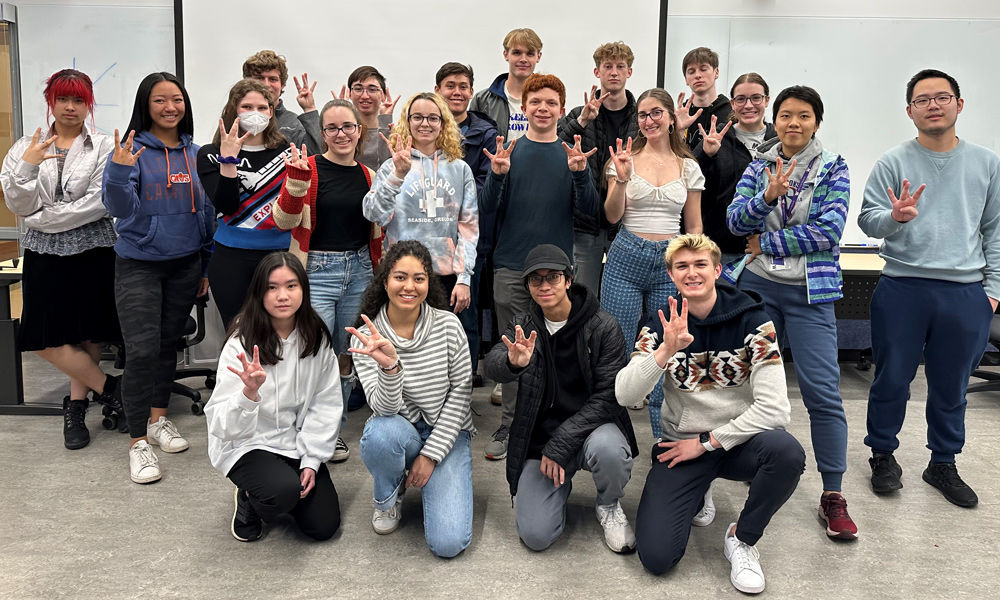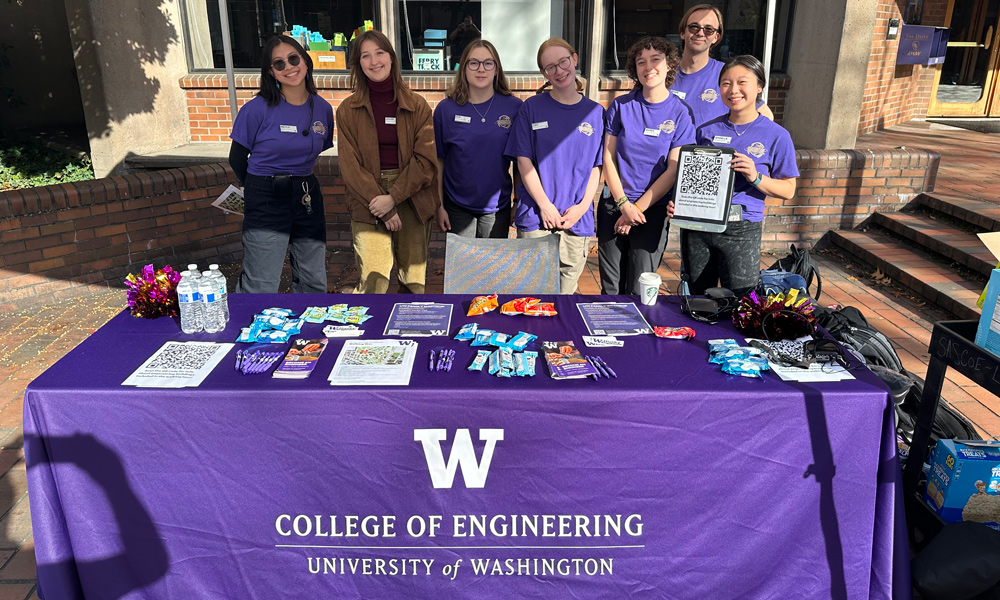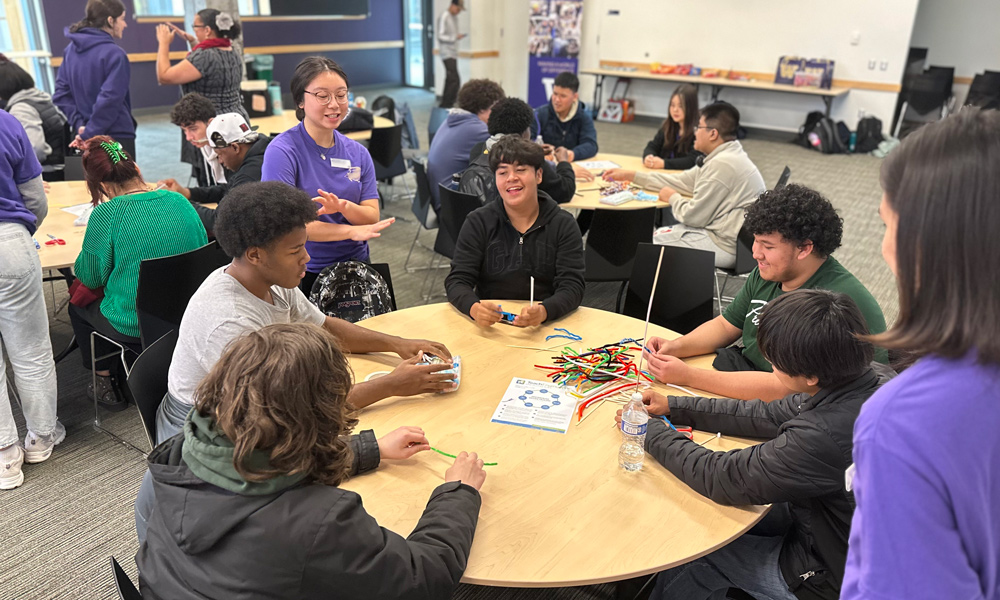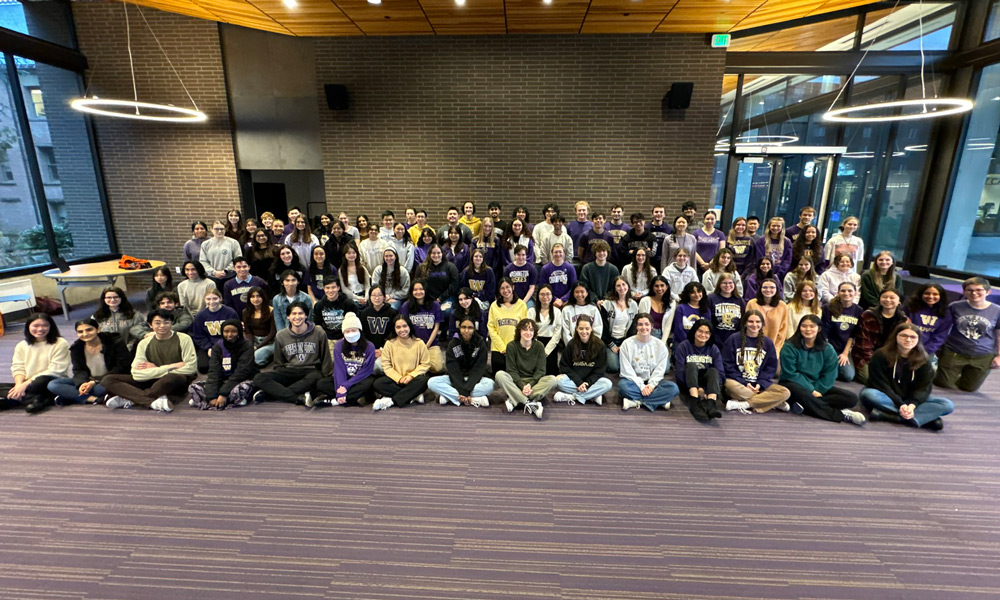By Brooke Fisher
The Emerging Leaders in Engineering program empowers undergraduates with advanced leadership skills to help shape the future of engineering.
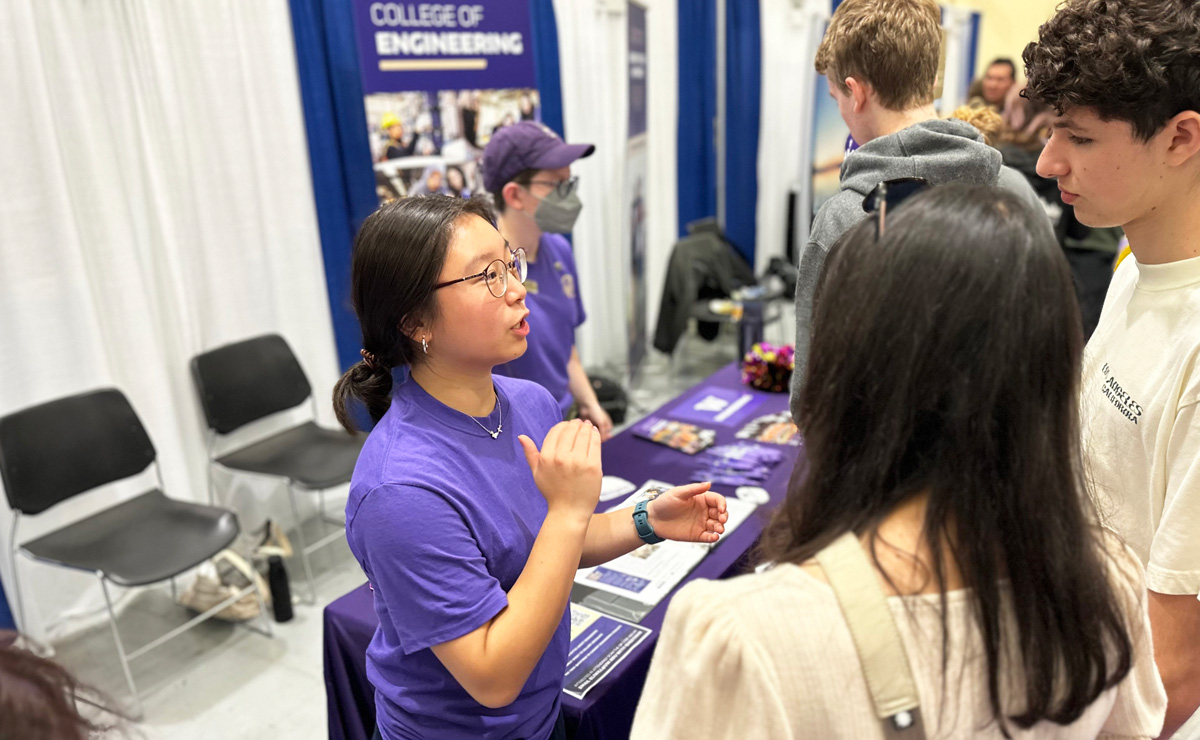
At last October’s National College Fair in Seattle, Engineering Ambassadors talk to prospective students and families about how and why they should apply to UW Engineering.
When civil and environmental engineering senior Jake Eko interviews for jobs, there’s one thing that prospective employers are eager to learn more about: the Emerging Leaders in Engineering (ELE) program. “Employers love to ask questions about it,” Eko says.
“It’s a unique program in the sense that I had a role in both teaching and leading — and a unique skillset that’s born because of that. I see it as an asset and employers do, too.”
Since it was founded six years ago, the ELE program has equipped hundreds of undergraduate engineering students with advanced leadership skills that complement their technical coursework. While some ELE students coordinate recruitment and outreach events to inspire the next generation of engineers, others teach makerspace workshops or mentor first-year engineering students.
“If they’re trained in leadership and trained as an engineer, students can go on to lead tomorrow’s companies,” says Dan Ratner, associate dean of academic affairs in the College of Engineering. “We see students come out of their shells. The ELE students become empowered and feel like they can answer questions, serve as an example and be looked up to.”
From founding to flourishing
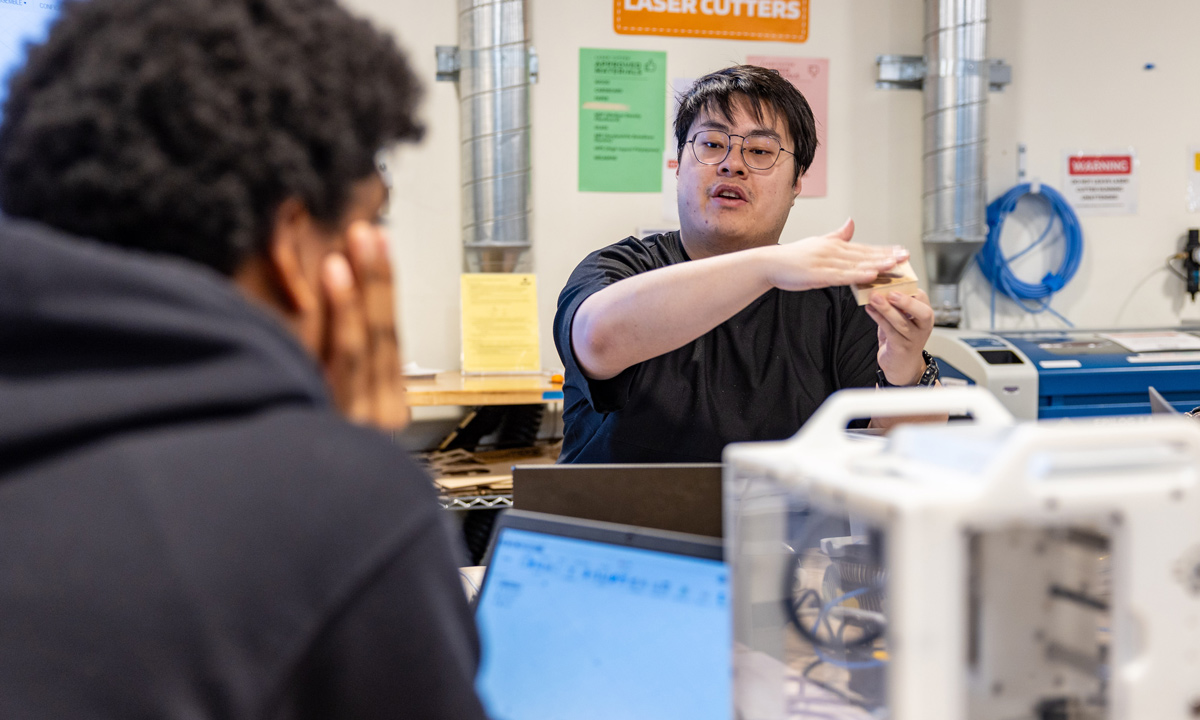
Engineering Design Coach Sky Song, who is a senior in mechanical engineering, teaches an intro to milling workshop at The MILL Makerspace in McCarty Hall in February 2024. Photo credit: Matt Hagen
The program has more than doubled in size since its launch. This year, 100 engineering students were selected from a record-breaking 318 applicants. Participating students, who receive scholarships and course credit, are spread across three sub-programs: Engineering Ambassadors (EAs), Engineering Design Coaches (EDCs) and Engineering Peer Educators (EPEs).
In addition to student leadership development, the ELE program helps support the Direct-to-College admission process, which admits first-year students directly to the College of Engineering with guaranteed access to an engineering major. Since incoming students — of which there are more than 1,000 — have one year before ranking their preferred engineering majors, the EPEs help guide them through an exploration process. Meanwhile, the EDCs provide hands-on technical instruction and the EAs ensure that prospective students and families understand the admissions process.
“The ELE students are hungry for this kind of experience and leadership opportunity,” says Shanai Lechtenberg, the college’s senior director for student academic services. “Many of the students share that this is the most impactful thing they’ve ever done at UW.”
ELE student sub-groups
- Engineering Ambassadors: Students connect with elementary, middle and high school students, as well as transfer students, through outreach and recruitment events to inspire interest in engineering. In 2022-23, they engaged with 4,000 students during 18 events.
- Engineering Design Coaches: Students design and lead hands-on workshops in makerspaces for undergraduates. In 2022-23, they taught 23 workshops to 247 students.
- Engineering Peer Educators: Students mentor first-year engineering students by leading a course within students’ E-FIGs. In 2022-23, they supported more than 1,000 incoming students.
Shaping a skillset
Considering what type of leader they want to be is an important first step for ELE students. A training course culminates with students writing a leadership philosophy. They also receive specialized instruction geared toward their specific sub-program. Together, the cohort learns high-level leadership skills such as facilitation, creating inclusive learning environments and public speaking.
The program utilizes expertise both within the college and across campus. The college’s Office of Inclusive Excellence offers diversity, equity and inclusion training, while speech coaching is provided by the Communication Department’s Center for Speech & Debate. One of the most frequent comments from ELE students is that they have greater confidence when addressing a large audience.
Related story
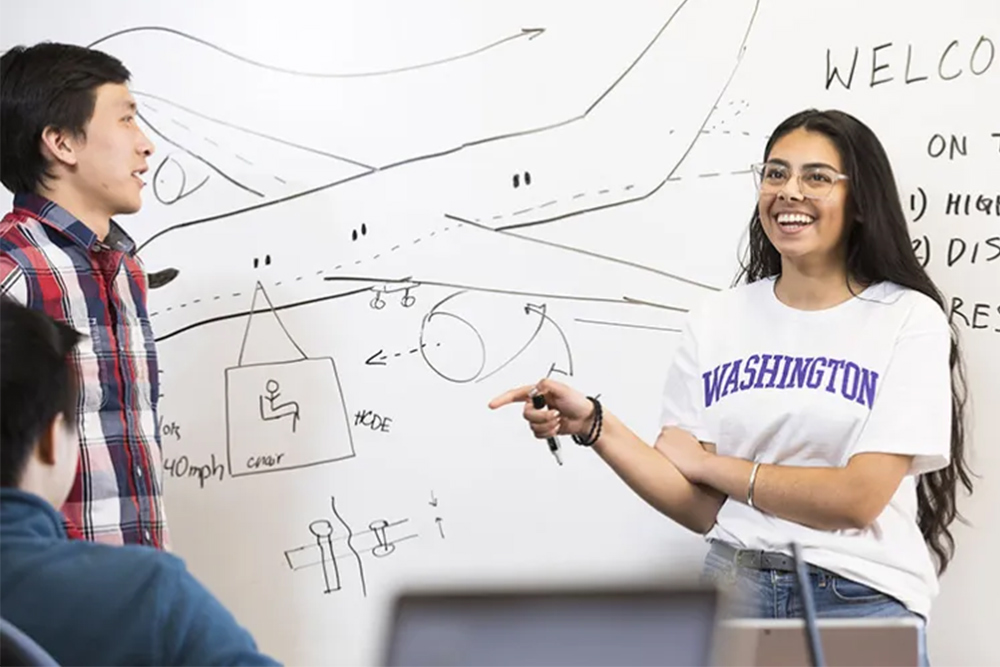
Peer-to-peer education
The inaugural Engineering Peer Educator (EPE) program was designed to help first-year Engineering Undeclared students transition into the community while providing upper-class students with leadership and mentorship opportunities.
“We would have group presentations in engineering classes, but no one teaches you how to do them,” explains bioengineering senior Aditi Prabhala, who has participated in the program for three years. “I’ve become a better public speaker and can effectively present information. Learning how to communicate in a way that is effective for everyone involved will be beneficial in my career.”
Another key set of skills is curriculum building and lesson planning. As an Engineering Peer Educator, Eko facilitated a GEN ST 199: University Community course as part of an Engineering First-Year Interest Group (E-FIG), with lessons geared toward exploring the 11 engineering majors and interdisciplinary career pathways.
“I learned a teaching skillset where I can go into groups and have a work-together mindset,” explains Eko. “In terms of engineering being a very technical field, this exposes soft skills — I can say I worked with 25 freshmen and taught a course. It’s one of the experiences that will have the most meaningful impact on my future.”
In addition, Prabhala and Eko list a variety of other essential leadership skills that they’ve honed — from accountability to active listening to leading outreach activities.
“As an engineering ambassador, we did a lot of outreach, such as workshops for transfer students and hosting elementary schools on campus for tours,” says Prabhala. “A lot of people depended on us.”
Applying mentorship to management
Employed at Boeing, alumnus Derek Wei (BSME ’20) started as a test engineer and is now an acting manager. The mentoring skills he developed as an EPE have been particularly helpful in advancing his career in a short amount of time, he says.
“I’ve been able to mentor folks on the team and help direct reports with removing roadblocks and overcoming challenges,” says Wei, who was awarded the 2020 Outstanding EPE of the Year award. “Being a peer educator helped me do that, especially having experience connecting with individuals, figuring out how to relate to them, and being a helping hand.”
Supporting roles
The success of the ELE program wouldn’t be possible without the dedication of the following staff members:
- Shanai Lechtenberg - Senior Director for Student Academic Services
- Lauren Fryhle - Associate Director of Advising & Student Engagement
- Eli Williams - Recruitment and Youth Engagement Program Manager
- Allie Carpenter - Lead Academic Adviser
- Dei Caudle - Instructional Technician
Student scholarships
The ELE program provides students with scholarships, which are possible thanks to donor support.
Originally published April 15, 2024
